Composting, Your Plant’s and the Environment’s Best Friend
Chemical fertilizers are being swapped out for compost, a greener alternative. Composting involves breaking down organic material into nutrient-rich soil that boosts plant growth. Studies show that food scraps in landfills release a lot of methane, a potent greenhouse gas. But those same scraps can be turned into compost instead. It’s not just food scraps—animal manure is also great for composting. In tonight’s installment of Belize on Reel, News Five’s Paul Lopez dives into the composting process.
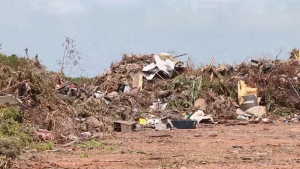 Paul Lopez, Reporting
Paul Lopez, Reporting
Have you ever wondered what happens to your organic food waste after you toss it in the garbage bin, and it’s picked up by the truck? Fruit and vegetable scraps, eggshells, bones, and leftover bread all end up at a nearby transfer station and are used as landfill. When mixed with other household garbage, these organic scraps decompose and release gases that are harmful to the environment.
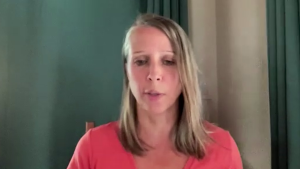
Tara Hoisington
Tara Hoisington, Consultant, Recycle Organics
“With climate change being a concern, there are three sources of methane contributing to climate change. The first is fossil fuel, the second is agriculture and the third is coming from landfills and waste. They found that twenty percent of methane contributing to greenhouse gases typically comes from organic matter being suppressed among other trash and in the anaerobic environment creates a gas called methane.”
Tara Hoisington, a consultant at Recycle Organics, explained that methane is twelve times more effective than carbon dioxide at trapping heat in the atmosphere. Recycle Organics is on a mission to reduce the amount of methane released into the air through backyard composting. But what exactly is composting? We asked Louis Wade Junior, the owner of Blessed Garden, to explain.
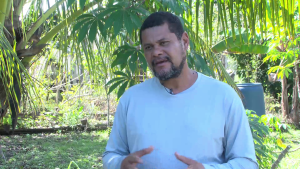
Louis Wade
Louis Wade, Owner, Blessed Gardens
“Composting is the human effort to duplicate humus, which is the natural process that takes place in the ecosystem. What composting does. It takes organic material and speed up the natural process of decay and decomposition, ensuring that the right nutrients are available for the plants you want to grow.”
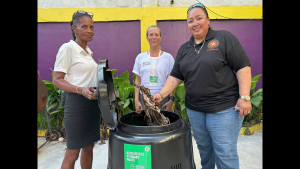 Tara Hoisington
Tara Hoisington
“Canada had donated two hundred compost bins to get backyard composting education program started in the country. We had gone into four town, San Pedro, San Ignacio, Belmopan and Corozal and we had distributed these bins. We done workshops. We are doing a six-month pilot program where we go to the person’s home who decided they want the bin, we give them tutorials, lessons on how to properly compost, as well as having a form to fill out every month to gauge how much food waste is getting diverted from the trash, as well as organic matter like leaves.”
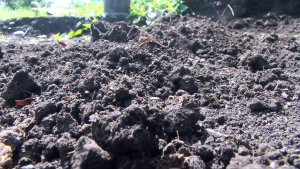 Hoisington shared that the initiative is off to a great start, with most participants eagerly using their compost bins and repurposing over half a pound of organic food waste daily. In Belmopan, Louis Wade has made composting a central part of his gardening operation.
Hoisington shared that the initiative is off to a great start, with most participants eagerly using their compost bins and repurposing over half a pound of organic food waste daily. In Belmopan, Louis Wade has made composting a central part of his gardening operation.
Louis Wade
“Most people want black dirt, they ask for black dirt, but they mean something by that, because soil color does not determine fertility. You can have very black soil, but if it does not have compost or organic material in it, then it is still not going to give you the results you want. So, when people say they want black dirt, what they are really talking about is that they want highly fertile soil that produces a good quality.”
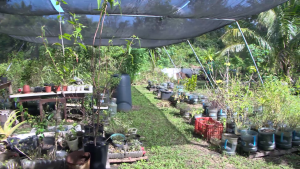 Unlike Recycle Organics, Wade uses animal manure for his composting. To the untrained eye, a mix of horse and chicken manure, rice waste, and a special blend of microbes from Belize Agro Enterprise Limited might look unappealing. But after weeks of decomposition and careful moisture management, the result is like gold for farmers.
Unlike Recycle Organics, Wade uses animal manure for his composting. To the untrained eye, a mix of horse and chicken manure, rice waste, and a special blend of microbes from Belize Agro Enterprise Limited might look unappealing. But after weeks of decomposition and careful moisture management, the result is like gold for farmers.
Louis Wade
“Horses and cows eat only grass, so you really should not be afraid of their poop. But when people think about poop, they have all these negative connotations. When in reality, the stomach of the cow and horse breaks it down in such a way that you still have these organic materials in cow and in horse. Another thing you can also use is tilapia. I will show you my little tilapia experiment. You feed the tilapia and fish also release ammonia, a little bit of uric acid into the water and so you can actually take that water from the tilapia, and you can actually water your plants with tilapia water and you will get the proteins you need.”
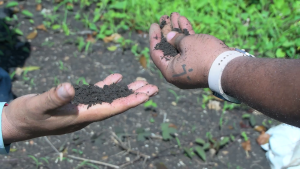 Wade mentioned that dried leaves and freshly cut grass are also great for making organic compost. He combines these materials with black soil to create a highly sought-after product that he sells all over the country.
Wade mentioned that dried leaves and freshly cut grass are also great for making organic compost. He combines these materials with black soil to create a highly sought-after product that he sells all over the country.
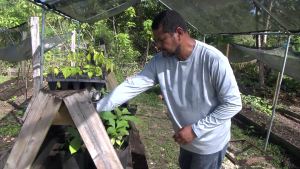 Louis Wade
Louis Wade
“How do you know very good soil, how do you measure very good soil. You measure very good soil, by squeezing it and then it is suppose to hold together and when you loose it it should break back apart. That is your test right there.”
Reporting for News Five, I am Paul Lopez







Facebook Comments